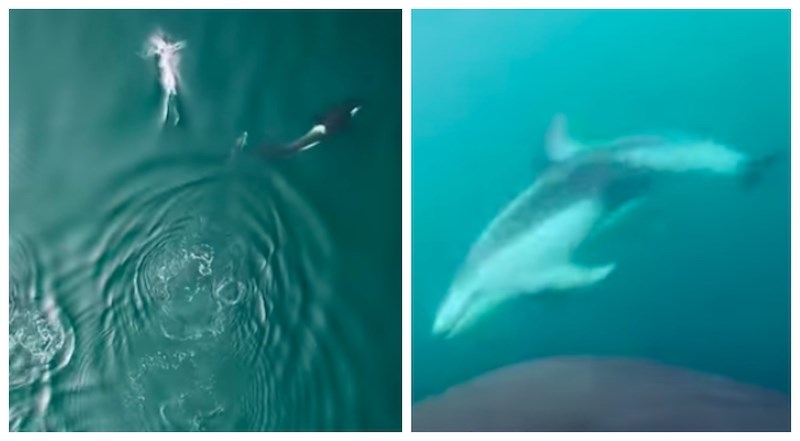Orcas are commonly spotted in B.C. waters, but other sea creatures typically keep their distance from them.
With impressive speed, expert hunting instincts, and fearsome size, they don't have any natural predators. Like wolves, the marine giants travel in packs and communicate through sophisticated vocalizations.
But southern resident orcas invite the attention of a much smaller, albeit no less agile marine inhabitant.
Pacific white-sided dolphins often swim and play with the local population, but they steer clear of contact with any others.
Professor Andrew Trites, director of the University of British Columbia's Marine Mammal Research Unit, tells Vancouver Is Awesome that the dolphins know which orca populations make safe swimming companions and which ones need to be avoided — and they can tell the difference from a great distance, too.
"We sometimes find white-sided dolphins interacting with resident killer whales," he explains. "We're often puzzled. Are they there just harassing them? [Are they] bow-riding them? Because they always seem to be so playful... maybe they are trying to steal food.
"That's a pretty cool thing because they don't play with transient killer whales... because if they did, they'd become dinner," he says with a smile. "For some reason, white-sided dolphins are able to tell the difference."
There are likely a couple of reasons why white-sided dolphins are able to tell the difference, notes Trites. "One is that resident killer whales have very distinct calls and they tend to be very chatty."
The dolphins can recognize the "friendly call" whereas the transient orcas tend to be "really quiet" until they've killed something. Then they've "got something to brag about."
Southern resident orcas primarily feast on chinook salmon, whereas transient orcas will eat just about everything else, from sharks to seals to whales and much more.
Would a killer whale attack a human who fell in the water?
While they could be dangerous, there aren't any records of them harming people in the wild.
"When a whale does come in close, [you] will feel threatened by them," he notes. " But there's no indication that they've ever caused any harm to people... and dolphins similarly."
Nevertheless, Trites adds that he "would not go in the water with one," even if it was one of the fish eaters. "I'd get out as fast as I could."
Sometimes even the resident orcas will play with things, he notes. And they aren't exactly gentle.
"They will grab the feet of a bird and drag it down and eventually drown it," he says. "They can play very roughly."
The marine giants often get mistaken for whales due to the popular moniker and because of their size. However, they are a member of the mammal family Delphinidae, which includes well-known oceanic dolphins such as the bottlenose and common dolphins, as well as some lesser-known species like the rare, petite Hector's dolphins.
Have a look at some orcas and dolphins swimming together.




